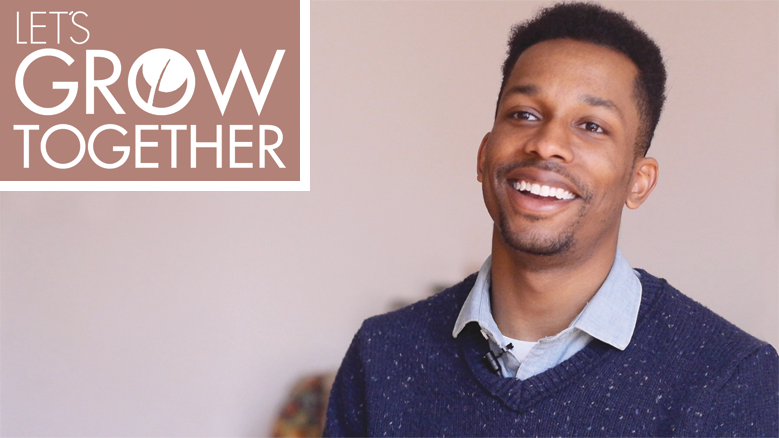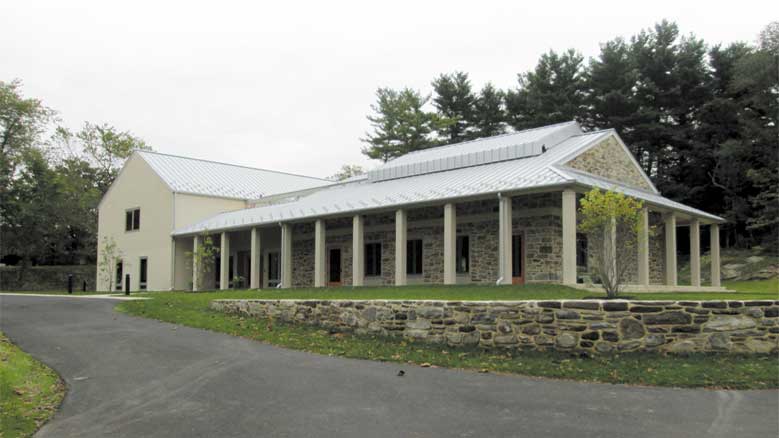
Sterling Duns, 27, is a Philadelphia-based educator, hip-hop artist, and musician. He was introduced to Quaker worship when he attended high school at Friends Central School in Wynnewood, Pa. He began going to Quaker meeting six years ago when he was a graduate student in England, and he became a member of Merion (Pa.) Meeting last year. He holds a bachelor’s in English from Dickinson College and a master’s in poetry from the University of East Anglia in Norwich, England. He sees his music, which he performs on his own and in the group City Love as an expression of his faith. “I want listeners to see a piece of themselves in my music while they get to see who I am. I want to promote healthy dialogue around social justice issues and bring people closer together.” You can listen to his music at Sterlingduns.com and Muchcitylove.com.
Jon Berry: Tell us about your meeting for worship experience: what is it like?
I was 14 when I first went, and like any 14-year-old boy who has never been to meeting, I was restless. I grew up in a Baptist church and this was the total opposite. It’s a learned skill to sit silently and open yourself to the messages around you. It has to be cultivated.
It’s beautiful to sit in silence and experience the search for truth that comes out of that silence and see the way messages land on the heart. So many times I’ve heard the message I’ve needed to hear. It really fuels me up for the week. I feel very off balance if I don’t go to meeting for worship on Sunday. It’s a gas station for my spirit.
Jon: How do you center yourself?
I try as best as I can to go into meeting with a clear heart and an open mind. I try to be mindful of my breathing and how my body is positioned. I try to be present and not get distracted. Merion Meeting has beautiful windows. It’s hard not to look out and get distracted. But then I bring myself back. Sitting still, being quiet, listening inwardly—these weren’t things I was taught growing up in West Philly. I’ve had to learn them. For a millennial, living in the twenty-first century, it’s really countercultural to put down your cell phone and reflect for an hour in silence.
Jon: What happens to you in meeting?
Meeting is a time to reflect on what’s important to me—virtues like love and patience and peace. My commitment to social justice is something I think about a lot. I reflect on immediate things: what the week was like, or a conversation I’ve had. It’s also a time to remind myself of the virtues and values I want to embody, and the people who are inspirations to me.
It’s important to make space for others’ messages. It’s a beautiful moment to sit for 30 to 40 minutes and someone stands up and breaks the silence. It’s a holy space, like the Bible verse, “where two or three are gathered together.” I feel in meeting like I’m on a quest with other people for higher truth.
Jon: Are there surprises for you in meeting?
Definitely. I can have a conversation with my mother or a friend about something and think I was right about a point, then sit in meeting for worship and something new opens up. Things come up that realign me to what I aspire to be. I didn’t come in here expecting that. It’s like a conversation that creates a new reality.
Jon: How do you see Quakerism working in your life?
I think a lot about who I want to be and how I want to be perceived by other people. I want to dedicate my life to issues of social justice, making life equitable, and working on equality. These are so important to Quaker faith, and it’s what Quakers have been doing for so long. I want to be a part of the history of those Quakers who have lived a life dedicated to fighting on behalf of others.
It’s important for me that the different sides of my life—my spiritual life and what I do in the world—are aligned. It would be so disjointed if I came out of meeting for worship and then lived a life that wasn’t aligned with my values.
I see the music I make as a manifestation of the internal work that I do. Hip-hop is a form of self-expression that was very much born out of a time, as a voice for African Americans to talk about a lot of issues they were facing. A lot of anger and hurt came through the music, a lot of beauty and celebration of culture as well. I think it’s important to speak truth to power, and hip-hop has done that in a lot of ways since its birth. For me, as a Quaker hip-hop artist, it’s important to not be ashamed to express hurt or anger or sorrow. They are real emotions. But I try to make them launching pads for deeper conversations about justice, community, and unity. I want people to have more tools than anger and hurt and pain. Bayard Rustin was angry. But he was also a Quaker who believed in nonviolence.
Jon: How have you been involved in your meeting?
I’m on a committee, Beliefs into Action, that’s working on pardons and expungements for returning citizens who have felonies. My passion for this committee’s work came about through a book group in meeting. We read The New Jim Crow. It’s one of the books that has changed my life. It made me so aware of the injustices of the justice system in our country. It lit a fire in me to educate and be active in restoring the rights and humanity of returning citizens in this area. I’m now understanding the importance of voting, and lobbying, and candidates’ stances on the issues—things I didn’t really care about in high school.
I’m one of the younger members of the meeting. I’ve never had a good friend who was 40 years older than me. I feel so grateful to have intergenerational bonds with people in meeting. After every meeting, one member provides little refreshments, like mangoes, so we can just enjoy, hang out, have conversations, and not rush off after meeting is done. We have potlucks periodically, which is great to bring the community closer together.
Jon: Where would you like to see Quakerism in the coming years?
I wish more people knew how awesome Quakers are and how much awesome work Quakers have done. I would love to see more members, more people part of meeting, more people from more communities knowing more about this option to grow spiritually and be active in the community. There’s a beautiful, rich history that Quakers have. I would just love for more people to know it and explore it.
I would love to see more young people. I just read an article about how young people have stepped away from organized religion. I think that’s a sign that they’re searching, and want something they can go deeper with. I think that Quakerism could be one thing that some young people could vibe with as they look for something deeper.
A lot of the conversations facing this country—about race, gender, sexuality, justice, the environment—ultimately, it’ll be the younger generation that will have to figure them out. How beautiful it would be for younger people who are mindfully seeking truth to do it in a community, here, in tandem with older people. I think the Quaker faith really has the power to change the world.
Sterling was also featured in a QuakerSpeak video in April of this year.
Right now: 6,134 Subscribers (as of August 2015)
Our goal: 12,000 Subscribers by September 2016
Learn more: Friendsjournal.org/grow




This interview is like a breath of fresh air! Thank you.
Volumes spoken in a few paragraphs. Thanks for presenting all that here.